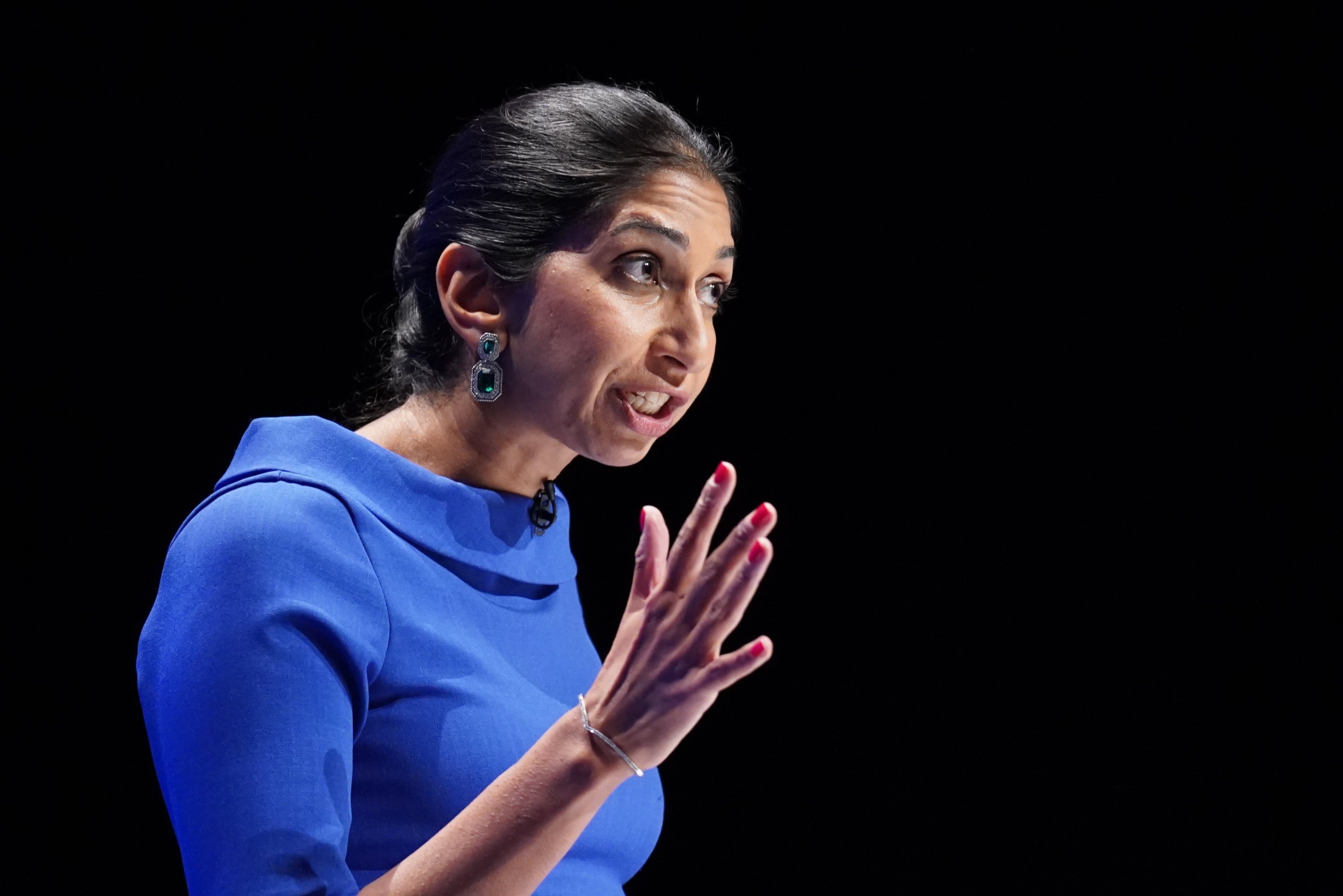Police chief hits back against ‘woke’ accusations after Braverman criticism
Chair of National Police Chiefs’ Council defends efforts after scandals over racist, misogynist and criminal officers

A police chief has hit back against accusations that officers are too “woke” following a series of attacks by the home secretary.
Martin Hewitt, chair of the National Police Chiefs’ Council (NPCC), said officers must defend action that builds public trust following a wave of scandals over racist, misogynistic and criminal police officers.
“If we are accused of being woke when taking action that we know is effective in building trust, with people where that increased trust is needed, we must stand tall and champion and defend that action,” he told a conference on Wednesday.
“We are rightly sceptical of token or gimmicks, meaningful action that works is what we need.”
In a press conference following his speech, Mr Hewitt said accusations of wokeness were “unhelpful” and that police were “doing practical things that will make the situation better”.
“Calling something woke is an easy one-liner that will get you a headline and it’s great on social media but I don’t think it’s particularly helpful,” he told journalists.
“Whatever community people are from they have got to feel that police are there for them and for some communities we have to do more to make sure they recognise that.
“We absolutely should be doing that and we shouldn’t be cowed when someone goes out publicly and accuses us of being woke.”
The NPCC chair said he had raised the issue directly with the home secretary, and “made the point in conversations is we need the trust and confidence of all communities”.
Addressing the conference later on Wednesday, Suella Braverman praised a police chief who she said had “rejected woke policing” and called for the “kind of policing the law-abiding, patriotic majority of the British public deserves and expects”.
She told senior officers gathered in London there should be “no politically correct distractions”, but that she supported initiatives and action to improve community engagement and representation in police.
Asked what evidence she had that such distractions were hampering police, Ms Braverman pointed to a single case - where a former officer won a legal challenge arguing that “non-crime hate incidents” violate freedom of expression.
It came days after a watchdog’s report found that thousands of racist, abusive, predatory, corrupt or unsuitable police officers were recruited or left in service because of failings in vetting and disciplinary procedures.

HM Inspectorate of Constabulary said there were warning signs before Sarah Everard was kidnapped, raped and murdered by serving Metropolitan Police officer Wayne Couzens - sparking a wave of ongoing inquiries.
Mr Hewitt, who is coming to the end of his four-year term leading the NPCC, said he had “repeatedly felt shame at hearing the actions of some individuals in our service and deep regret that we didn’t get these people out sooner”.
He said there were “pockets of toxic culture” in policing and that female, ethnic minority and gay officers were at risk as well as the public.
“We must solve the problems - urgently, fully and for the long term,” he added. “Public confidence and the confidence of our people depends on it.”
In an open letter to police chiefs in September, Ms Braverman claimed there was a “perception that the police have had to spend too much time on symbolic gestures, than actually fighting criminals”, and that diversity and inclusion initiatives had “taken precedence over common sense policing”.
Mr Hewitt refuted the accusations and said that diversity and inclusion work inside policing and with the public was “important for us to deliver what we need to deliver”.
“If we want to work with Black communities and have them feel we are there for them, and have people come forward when incidents happen so we can investigate and prosecute, that is diversity and inclusion,” he added.
During Ms Braverman’s speech to the Conservative Party conference weeks after the letter, she called for “more PCs, less PC”, said it was “wrong” for officers to take the knee following the killing of George Floyd and accused officers of wasting time by “pandering to identity politics”.
Mr Hewitt said police were being “held back” from cutting crime levels by demand to respond to other kinds of incidents, which include mental health incidents and cardiac arrests.
The NPCC chair said more than half of all calls to police were for “something other than a crime”, adding: “A substantial proportion see police stepping into health and social work because of an absence of other service provision.
“This issue has been raised at every one of these summits and I, and many others, have discussed it with every recent home secretary and policing minister. But there has been no meaningful change – and that needs to happen if we are to improve crime reduction and detection rates.”
Mr Hewitt called for the government to address the “vast widening” of police responsibilities and questioned why a royal commission on criminal justice promised in 2019 had not been launched.
“The criminal justice system desperately needs reform,” the senior officer said.
He warned that despite the government’s pledge to recruit 20,000 extra police officers by March, numbers had still not recovered to those seen before cuts started in 2010.
Mr Hewitt cautioned the government about making further cuts to policing and criminal justice, adding: “More pressure on other public services means more pressure on the core policing mission.”






Join our commenting forum
Join thought-provoking conversations, follow other Independent readers and see their replies
Comments